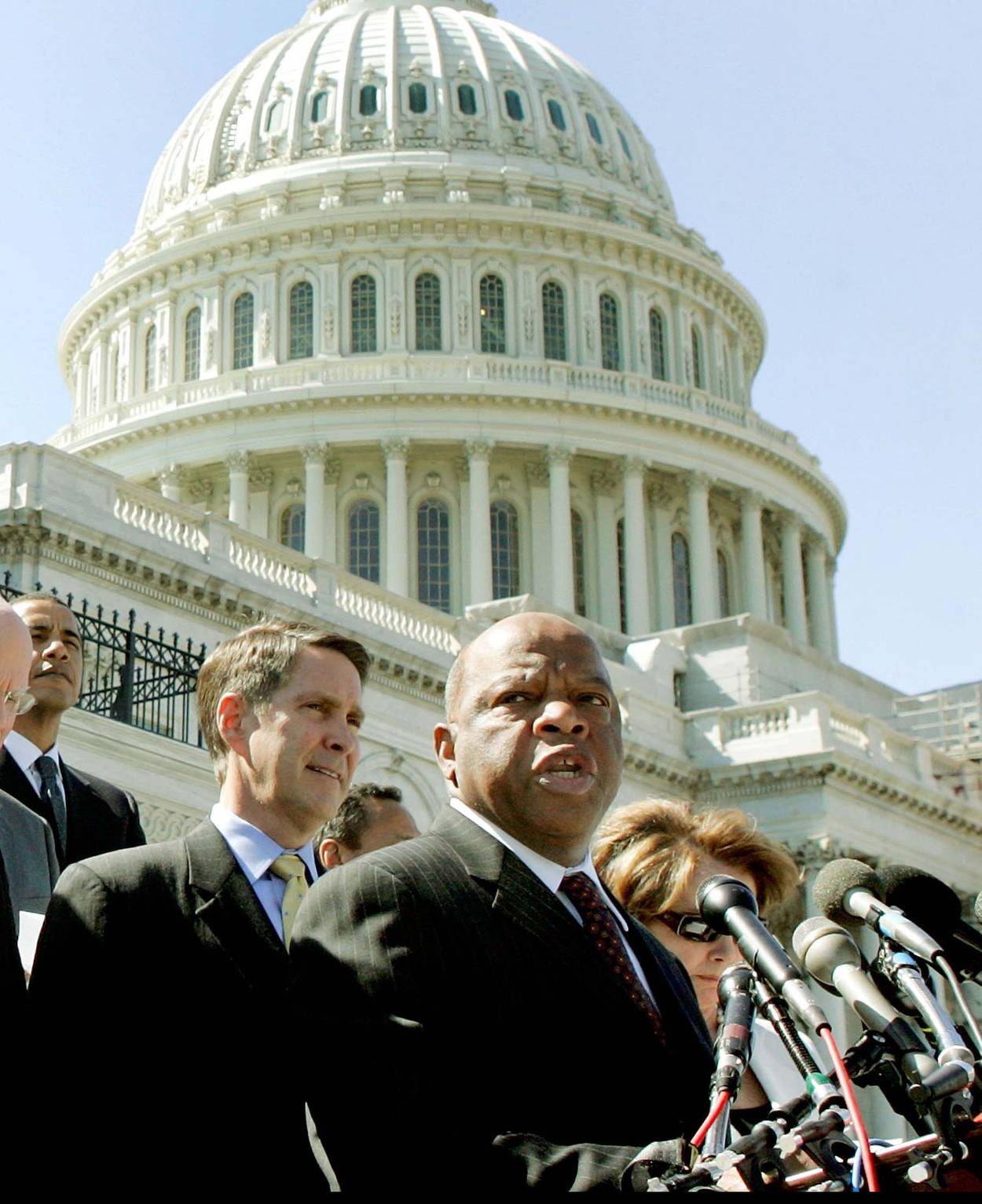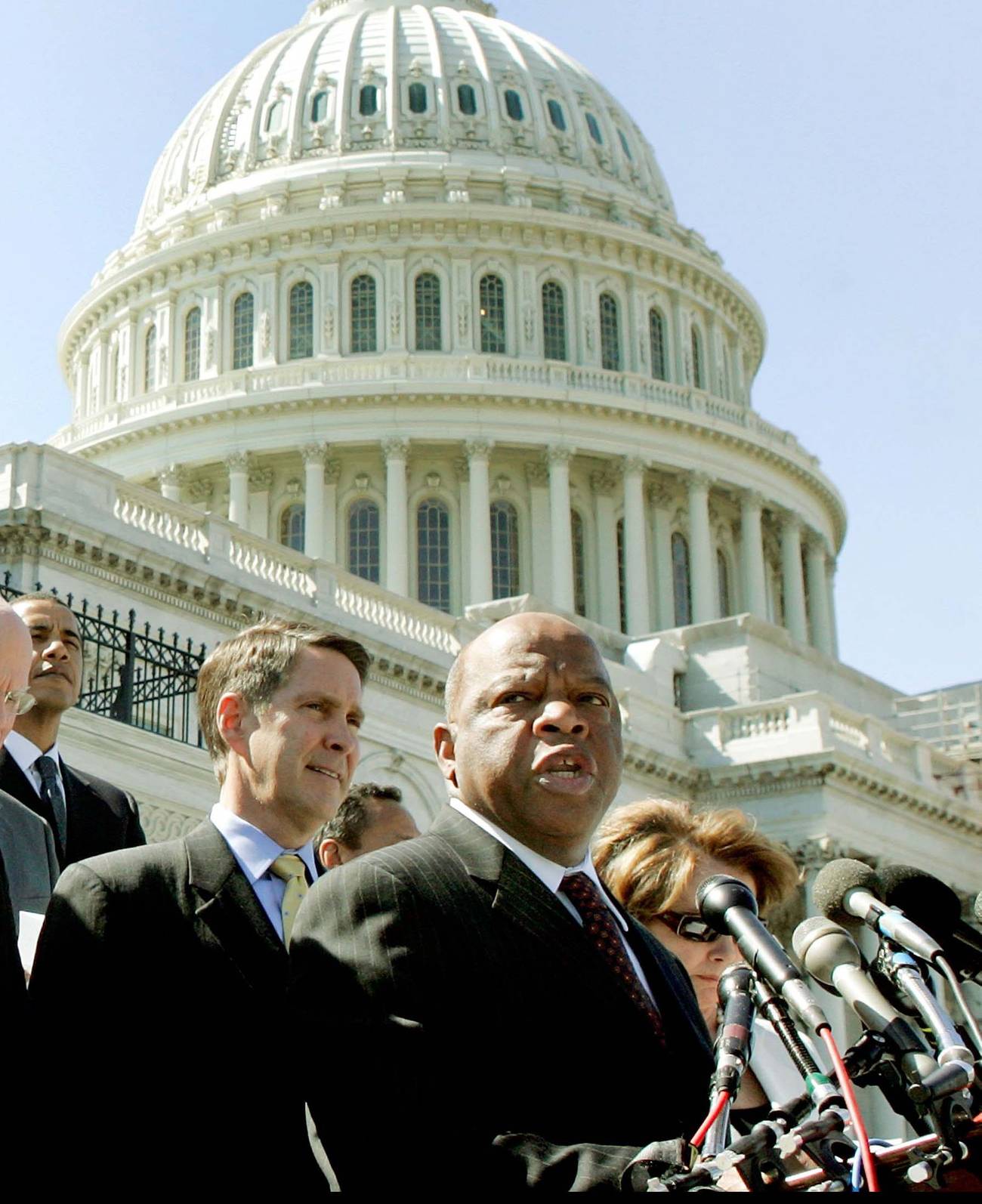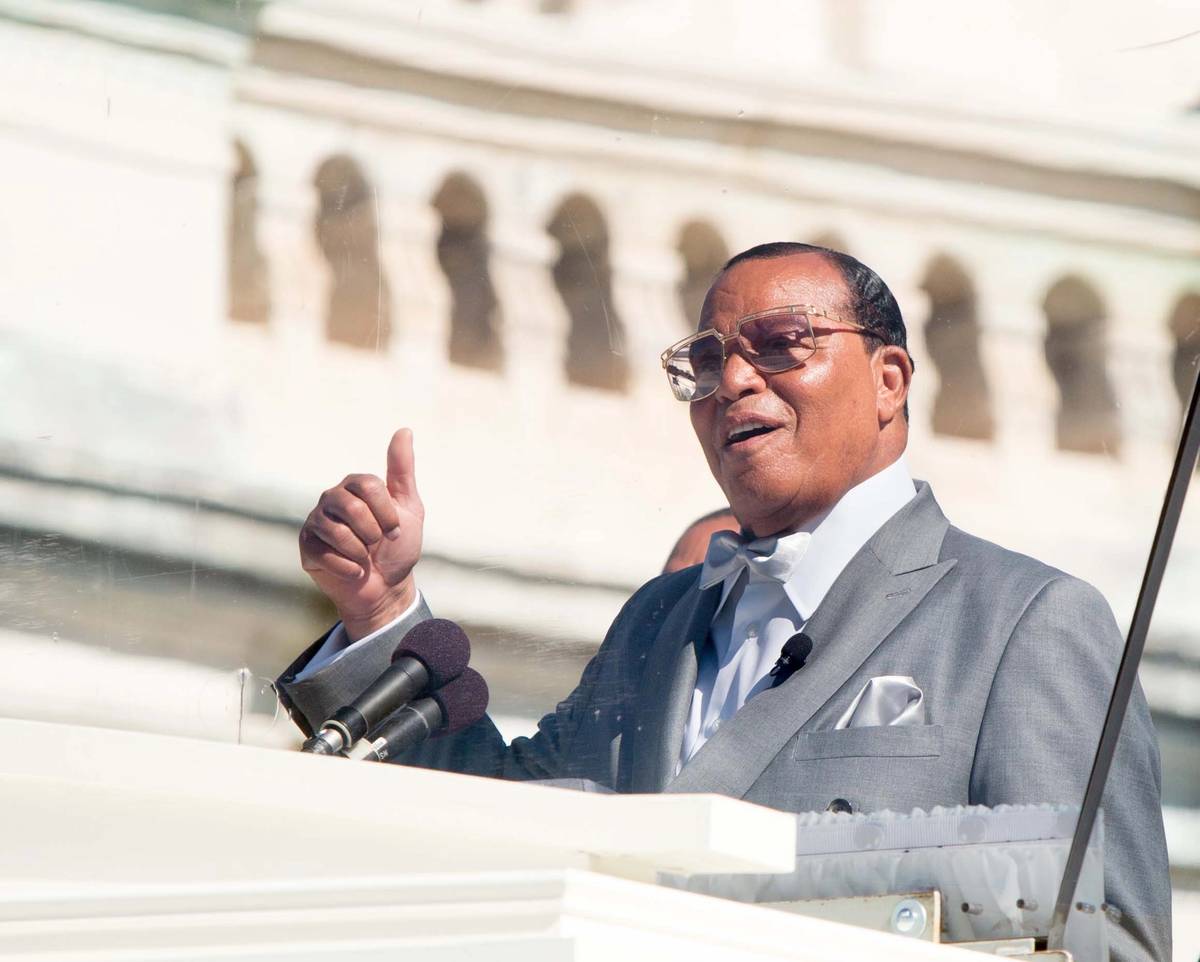The Man Who Opposed Hate
Among John Lewis’ many virtues: He refused to normalize Louis Farrakhan and the Nation of Islam, even as other prominent African American celebrities and politicians did




On Oct. 16, 1995, hundreds of thousands of African Americans traveled to Washington, D.C., for the Million Man March. Convoked by Nation of Islam leader Louis Farrakhan, the event aimed to “convey to the world a vastly different picture of the Black male.” Arriving less than two weeks after O.J. Simpson was acquitted of double homicide, at a time when America’s racial gulf seemed wider than at any point since the heyday of Jim Crow, the Million Man March held the promise of being, in the words of Glenn Loury, a “great moment in American cultural politics.”
That the march was not such a moment owes entirely to the man who organized it. Farrakhan’s well-documented history of anti-Semitic, racist, sexist, and lunatic remarks, however, did not dissuade a long list of African American luminaries including Maya Angelou, the Rev. Jesse Jackson, Reps. John Conyers and Charlie Rangel, and Rosa Parks from speaking under his aegis.
John Lewis was not among them. The Democratic congressman and civil rights icon, who died last week at the age of 80, could not “overlook past statements by Louis Farrakhan—and others associated with the Nation of Islam—which are divisive and bigoted.” While Lewis, writing in Newsweek, believed that the “goal of encouraging African American men to be responsible is sound,” the march was “fatally undermined by its chief sponsor.” He would therefore not attend the event, as it went “against what I have worked for—tolerance, inclusion, integration.”
This was not the first time Lewis deployed the moral authority he earned on the Edmund Pettus Bridge against the “most popular anti-Semite in America.” In 1993, a Nation of Islam leader named Khalid Abdul Muhammad delivered a speech accusing Jews of “sucking our blood on a daily and consistent basis” and bringing the Holocaust upon themselves. After three months of protest, Farrakhan held a news conference to address the controversy surrounding his lieutenant. “While I stand by the truths that he spoke,” Farrakhan hedged, “I must condemn in the strongest terms the manner in which those truths were represented.” Muhammad, he elaborated, was “brilliant, highly gifted, committed.” His “truths,” furthermore, derived from The Secret Relationship Between Blacks and Jews, a repulsive NOI tract alleging Jewish “control” over the international slave trade.
Farrakhan’s sly equivocation was sufficient for the NAACP, which announced that it was not only “satisfied” with his “condemnation” but “prepared to believe Minister Farrakhan’s statement that he is neither anti-Semitic nor racist.”
John Lewis was not satisfied. In fact, he was “surprised” that an organization with so storied a legacy of fighting bigotry as the NAACP would prioritize the avoidance of conflict with a powerful Black leader over the moral imperative of denouncing his unmitigated and undisguised hate. “You have to bring the filth from under the rug and out of the dark corners so we can deal with it,” Lewis stated.
It is both sad and telling, then, that Lewis’ death has coincided with a flood of anti-Semitic filth from a series of prominent Black athletes and celebrities like rapper Ice Cube, TV personality Nick Cannon, radio host Charlamagne tha God, and athletes Stephen Jackson and DeSean Jackson, who have all cited Farrakhan’s anti-Semitic words and ideas, with astonishingly little pushback.
While famed basketballers Kareem Abdul-Jabbar and Charles Barkley both forthrightly condemned these hateful remarks, it is notable that both men professed their astonishment at the general silence with which these statements were otherwise greeted, as if such ugly and stupid sentiments were thought of as normal within African American communities.
When Tablet asked Democratic Whip Jim Clyburn, the seniormost African American serving in Congress, about the torrent of anti-Semitic bigotry issuing from many visible African Americans all at once, he issued a forceful statement reminiscent in some ways of his friend John Lewis. “Anti-Semitism, like all forms of hatred and bigotry, is wrong,” he said. “As a student of history, I know how this scourge has emerged across different communities, ideologies, and centuries; it has caused harm in all its manifestations. Anti-Semitism cannot be tolerated or excused but must be confronted and eradicated.”
Unlike Lewis, however, Clyburn could not bring himself to condemn Farrakhan—the unquestioned fountainhead of anti-Semitic bigotry within the African American community—by name; it is perhaps even more notable that other senior African American lawmakers like Hakeem Jeffries would not comment at all.
That awkward silence might stem from the fact that the Congressional Black Caucus has a long history of recognizing and meeting with Farrakhan. It was only two years ago that a photograph of one such 2005 meeting surfaced, in which a grinning Farrakhan stands alongside a young Illinois senator named Barack Obama. The photographer who took the image “gave the picture up at the time and basically swore secrecy” when a CBC staffer called him after the event “sort of in a panic.”

Asked then about his close relationship with Farrakhan, Rep. Danny Davis—a CBC stalwart from Chicago—scoffed at the question. “That’s just one segment of what goes on in our world,” he said. “The world is so much bigger than Farrakhan and the Jewish question and his position on that and so forth. For those heavy into it, that’s their thing, but it ain’t my thing.”
Opposing anti-Semitism ain’t a lot of people’s thing these days. According to the progressive catechism known as intersectionality, the hatred espoused by Farrakhan and others of his ilk is of negligible concern because he and his followers lack “power.” Jews, classified as “white” bearers of “privilege”—despite being gassed alive and starved and beaten to death by the millions within the living memory of the community—are therefore inherently “powerful” rather than “oppressed.”
Such abstruse theorizing must come as cold comfort to the more than 200 Jewish New Yorkers violently targeted in hate crimes last year—a figure comprising over half of all hate crimes in the city—the vast majority of them perpetrated by Black and Hispanic men. As it must to the families of the four people murdered in the shooting at a Jersey City kosher market by followers of the Black Hebrew Israelites—a religious sect whose members believe much of the same nonsense spouted by Farrakhan and his celebrity acolytes and ass-kissers, who include Jay Z, Kanye West, Jay Electronica, and other members of hip-hop royalty.
Opposing anti-Semitism, however, was John Lewis’ thing. Just as opposing homophobia and every other form of bigotry was his thing, even if it occasionally set him apart from his putative ideological and racial allies. “I follow my conscience, not my complexion,” he said.
John Lewis was a true universalist: He stood up against injustice, no matter the offender. “I say that as long as one Jew is denied the right to immigrate, as long as one Jew is denied the right to be Jewish in the Soviet Union, we all are Jews in the Soviet Union,” Lewis declared in 1987, drawing an explicit parallel between the African American Civil Rights Movement and the campaign to free Soviet Jewry. Last year, following repeated anti-Semitic remarks by Democratic Congresswoman Ilhan Omar, Lewis co-founded the Congressional Caucus on Black-Jewish Relations.
In his essay explaining why he could not join the Million Man March, Lewis invoked a very different mass gathering, led by a very different man. As the 23-year-old chairman of the Student Nonviolent Coordinating Committee, Lewis was the youngest speaker at the March on Washington led by the Rev. Dr. Martin Luther King Jr. in 1963. Looking out onto the National Mall, Lewis saw a “sea of humanity” composed of “Blacks and whites, Protestants, Catholics, and Jews.”
The Million Man March, led by a Black separatist anti-Semite, was antithetical to the spirit of King, who “would never have called for an all-Black” gathering. Integration, the cause for which King died and Lewis shed blood, was not only “morally right,” but “a practical necessity for African Americans.”
Along with the rest of the country, Jews have been called upon these past two months to recognize the pain and suffering of their Black fellow citizens. That is right and just. But if the extraordinary life of John Lewis teaches us anything, it’s that empathy should not be a one-way street—just like hatred is not a one-way street.
James Kirchick is a Tablet columnist and the author of Secret City: The Hidden History of Gay Washington (Henry Holt, 2022). He tweets @jkirchick.